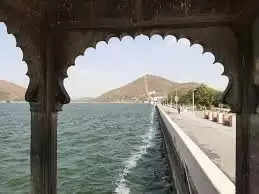Bhopal Bench of National Green Tribunal takes action to safeguard Fateh Sagar lake in Udaipur
Wetland rules to apply to the 'Zone of Influence' of Fateh Sagar
In a groundbreaking verdict, the Bhopal Bench of the National Green Tribunal addressed a petition concerning the preservation of Udaipur's Fateh Sagar Lake. The tribunal's ruling focused on various critical aspects, including noise pollution and light pollution in the vicinity of the lakes, as well as the imperative need for the conservation of the "Zone of Influence" of Fateh Sagar lake's ecosystem. This landmark decision marks a significant step towards safeguarding the environmental integrity and ecological balance of Fatehsagar Lake and its surrounding areas.
The decision rendered by the Bhopal Bench of the National Green Tribunal is poised to serve as a milestone in the protection and conservation of lakes throughout the nation. As a result of this landmark ruling, comprehensive rules and guidelines will be formulated to address the issue of light pollution across the entire country. These regulations will specifically tackle the adverse effects of intense artificial lights within the lake vicinity and on their shores. By doing so, the authorities aim to preserve the pristine beauty and ecological balance of lakes and ensure their sustained well-being for future generations.
Advocate Maitreya Prithvi Raj Ghorpade represents the petitioner, Udaipur's lake expert, Dr. Anil Mehta, in collaboration with environmental lawyer Bhagyashree Pancholi for this particular petition. During the hearing, the bench, presided over by Justice Sudhir Aggarwal and expert Dr. Afroz Ahmed of the Authority, addressed the concerns regarding the impact on the ecosystem of Fatehsagar Lake. Citing the Supreme Court's decision in the case of Balakrishnan and others vs. Union of India, the bench stated that even if a lake or pond has not been officially notified as a wetland by the state government, if it is among the two lakh fifteen thousand wetlands listed in the Wetland Atlas of the Government of India, the state governments are obligated to protect it as per the provisions laid out in Section 4 of the Wetland Conservation Rules 2017. This ruling emphasizes the importance of safeguarding all such water bodies and highlights the responsibility of state governments in their preservation efforts.
As a consequence of this decision, all the lakes within the state, including Fateh Sagar, Pichola, Badi, Udai Sagar, and Jaisamand, will henceforth be required to receive protection under the provisions and restrictions outlined in Section 4 of the Wetland Conservation Rules. Regarding Fatehsagar Lake, the Authority has issued a directive to the Rajasthan State Wetland Authority, instructing them to delineate the "zone of influence" surrounding the lake's catchment area. This zone will encompass the area where various activities might have a negative impact on the lake's ecosystem and ecosystem services. The Authority emphasizes the importance of safeguarding this impact area under the purview of the Wetland Rules, ensuring the preservation and well-being of Fateh Sagar Lake's ecological balance and natural functions. The green authority has declared that the regulations specified for the Sajjangarh Eco-Sensitive Zone will be applicable to Fatehsagar Lake and its impact area.
The judgment clarifies that despite Fatehsagar Lake and a portion of its 'zone of influence' being situated within the eco-sensitive zone of the Sajjangarh Wildlife Sanctuary, the responsibility to protect Fatehsagar and its influence area lies with Rajasthan's Principal Secretary of Environment and Climate Change, Principal Chief Conservator of Forests, Wildlife, and all relevant assistant officers. They are obligated to ensure the safeguarding of Fatehsagar and its influence area in accordance with the provisions of the eco-sensitive zone. Additionally, the authorities must promptly issue a wildlife sanctuary notification for this particular area to further enhance its protection and conservation measures.
The State Wetland Authority has imposed strict regulations, prohibiting any construction of a permanent nature, except for boat jetties, within a distance of fifty meters from the average level of the highest fill level (HFL) of Fatehsagar Lake over the last ten years. Encroachment and non-reservoir land conversion within the lake and its impact area are strictly prohibited. Furthermore, measures will be taken to ban activities such as solid waste and electronic waste disposal, sewage discharge, entry of contaminated water, and poaching within the lake and its surroundings.
One of the most significant aspects of the green authority's decision pertains to addressing "light pollution in lake areas." The petitioners, Anil Mehta, environmental jurist Bhagyashree Pancholi, and advocate Maitreya Prithvi Raj Ghorpade, presented scientific articles highlighting the detrimental effects of light pollution in the petition. This evidence played a crucial role in shaping the authority's decision to prioritize measures to control light pollution, which is essential for preserving the ecological balance and natural environment of the lake.
In response to the presented scientific articles on light pollution, the Authority acknowledged that there has been no substantiated investigation or research conducted specifically on the context of Indian conditions, and no such records have been maintained thus far. Nonetheless, the Authority recognized the potential harm that high-intensity light can cause to wildlife, various species, and the overall environment. While acknowledging the importance of addressing this issue, the Authority emphasized the necessity for a detailed study to formulate proper guidelines and regulations.
Consequently, the Authority directed the Ministry of Environment and Climate Change and the Ministry of Science and Technology, Government of India, to undertake the required study on 'light pollution' and establish provisions to regulate such pollution in the Indian context.
Additionally, the Authority issued directions to the concerned entities, including Environment and Climate Change, Rajasthan State Wetland Authority, Rajasthan State Pollution Control Board, District Collector, and Municipal Corporation Udaipur, to submit a compliance report to the Central Zone Bhopal Bench by November 15, 2023. This report should confirm their adherence to the instructions provided in response to the petition, ensuring the implementation of necessary measures to safeguard Fatehsagar Lake and its impact area effectively.
To join us on Facebook Click Here and Subscribe to UdaipurTimes Broadcast channels on GoogleNews | Telegram | Signal



